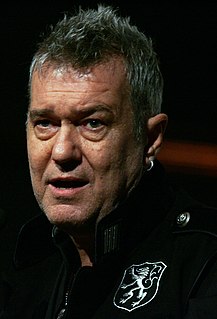A Quote by Robert Hass
Another problem about writing about politics in the "age of globalization" is that so much of the violence in the form of war and also in the forms of institutional violence - sweatshops, child labor, victimization of people economically - happens elsewhere and out of sight. And when we do know about it and need to witness it, it's always mediated by images of one kind or another, so you're kind of stuck trying to write about what it's like trying to be you living your life thinking about and experiencing this stuff in that way.
Quote Topics
About
Age
Also
Always
Another
Child
Child Labor
Economically
Elsewhere
Experiencing
Form
Forms
Globalization
Happens
Images
Institutional
Kind
Know
Labor
Life
Like
Living
Much
Need
Out
People
Politics
Problem
Sight
Stuck
Stuff
Sweatshops
Thinking
Trying
Victimization
Violence
War
Way
Witness
Write
Writing
Your
Related Quotes
Some studies have shown close to 70 percent of men who are in prison have one of two things in common: One, they can't read. And two, they witnessed violence or were victims of violence as a child. You would think that if you had seen your mother get beaten when you were 10 years old, you'd never raise your hand to a woman. Not true. The prospect that you will increases dramatically if you witness violence. So it's so much bigger than just about women. It's about our society. It's about our culture. It's about who the hell we are.
My approach to violence is that if it's pertinent, if that's the kind of movie you're making, then it has a purposeI think there's a natural system in your own head about how much violence the scene warrants. It's not an intellectual process, it's an instinctive process. I like to think it's not violence for the sake of violence and in this particular film, it's actually violence for the annihilation of violence.
What we're thinking about is a peaceful planet. We're not thinking about anything else. We're not thinking about any kind of power. We're not thinking about any kind of struggles. We're not thinking about revolution or war or any of that. That's not what we want. Nobody wants to get hurt. Nobody wants to hurt anybody. We would all like to be able to live an uncluttered life. A simple life, a good life. And think about moving the whole human race ahead a step, or a few steps.
Writing New People I was thinking a lot about the era that I came of age - the 90's. Brooklyn, in particular, this moment when I lived there. The sense of possibility. I was also trying to find a way to write about Jonestown. I had read about it a lot and I had the sense that the story could really start to drive one over the edge.
When we speak about a culture of violence in the American society, we're not just talking about the mass killers. We're also talking about that we, as a society, and many of us as individuals accept violence as part of life because we have become numb to it, being so exposed to it in various forms of media.
What's very interesting about the violence in Lebanon and the violence in Iraq and the violence in Gaza is this: These are all groups of terrorists who are trying to stop the advance of democracy. They're trying to thwart the will of millions who simply want a normal, hopeful life. That's what we're seeing.
Depression is about anger, it's about anxiety, it's about character and heredity. But it is also about something that is in its way quite unique. It is the illness of identity, it is the illness of those who do not know where they fit, who lose faith in the myths they have so painstakingly created for themselves. It is a plague - especially if you add in its various forms of expression, like alcoholism, anorexia, bulimia, drug addiction, compulsive behavior of one kind or another. They're all the same things: attempts to avoid disappearance, or nothingness, or chaos.
It's not hard for me to be honest with my fans because that's what I set out to do from the beginning - I've based my entire career off of just trying to do that for them - but I always kind of forget that my real life friends can hear my music and they can watch my interviews if they want and that's when I get kind of like- "oh..." - I don't necessarily sit down and talk to my friends about all the things that I write my music about, because it's easier for me to write music than to sit and talk to my friends about it sometimes- it's almost like writing in a diary.
I write and speak about personal and spiritual growth. One week I write about illness and another week I speak about relationships and another week I write about work and money and another week I speak to people with obesity issues. I write about whatever wounds seem to cry out for more enlightened solutions, and the love that heals them all.
I don't like realism. We already know the real facts about li[fe], most of the basic facts. I'm not interested in repeating what we already know. We know about sex, about violence, about murder, about war. All these things, by the time we're 18, we're up to here. From there on we need interpreters. We need poets. We need philosophers. We need theologians, who take the same basic facts and work with them and help us make do with those facts. Facts alone are not enough. It's interpretation.







































